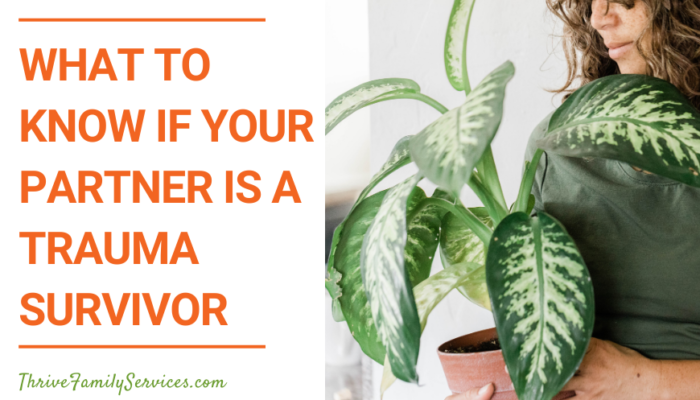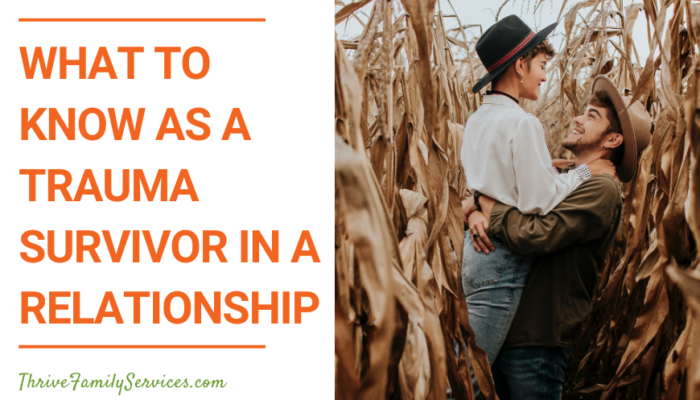What is trauma?
Trauma is anything outside of the range of normal human experience that overwhelms the central nervous system. Last post, we talked about “small t” trauma and how pervasive and impactful it can be on a person, though we don’t talk about it enough in our society. Trauma is a life-changing experience, and if you’re in a relationship with a trauma survivor, you may not know how to be supportive of your partner.
We outlined the main differences between “big T” and “little t” trauma: “Big T” trauma is probably what you think of when you think of trauma. It’s things like child abuse, a plane crash, unexpected or tragic loss of a loved one, etc. “Little T” trauma are those events that are traumatic on a personal level. This can be things like emotionally neglectful parents, witnessing abuse, emotional abuse, etc.
“Small t” traumas add up… The effect that it [“small t” trauma] can have when it accumulates begins to change the way we relate with others. Small traumas aren’t life-threatening, but many small traumas compounded together can increase a person’s distress level and interfere with their emotional functioning.”
In this post, we want to talk about how trauma can affect your relationship. Specifically – what do you need to know if your partner is a trauma survivor?
The first key thing to understand: while there is “big T” and “small t” trauma, all traumas can significantly impact a person’s sense of safety in the world and in relationships, sometimes for a very long time.
The good news is that we are hard-wired to heal best in the arms of someone who loves us. As the partner of a trauma survivor, you have incredible potential to be the person that helps your partner heal deeply and completely.
No matter the type of trauma your partner has experienced, it is something that deserves to be taken seriously. Many “small t” trauma survivors struggle with overcoming the mindset that because they didn’t experience a “big t” trauma, they shouldn’t be struggling and don’t deserve healing. It can be helpful to remind your partner that they deserve healing as much as anyone. (Of course, asking your partner what sort of support they need instead of assuming and jumping in is always a good idea!)
Remember there is no “one size fits all” impact trauma can create.
Trauma looks different in everyone. The things that trigger your partner are going to be specific to them, and their experience with trauma. While it can be a wonderful and thoughtful idea to do your own research on trauma (and a great way to show your partner you are serious about being a support for them) remember that the general trauma information you learn might not be how your partner experiences their trauma.
Trauma and traumatic responses are not a choice
One of the most important things to keep in mind when you love someone who has “endured more than most” is that they will get triggered or reminded of their traumatic experience and have a reaction, sometimes a very strong one.
When a traumatized brain feels threatened, neither the fact that the person feels fear or has memories arise, nor the fact they react by some version of fight, flight (leaving), or freezing is a choice they are actively making.
In fact, most trauma survivors experience their triggers and trauma responses as highly distressing, and would love nothing more than to never have them again.
If you love someone who has experienced trauma, patience and understanding are going to be your best tools. If you get frustrated that your partner has a trauma response because you say, “I’m not that person who abused you,” you are likely to increase your partner’s feelings of shame and get the two of you stuck in a really painful, negative cycle.
Rather, if you can hold onto the fact that this response isn’t about you, doesn’t represent who you are at all, you have a chance to be a real hero to your partner in a moment of great need.
For example, people who have experienced trauma might slip into “survival mode” in situations that seem totally non-threatening to you:
If your partner grew up in an abusive environment, where yelling meant someone was about to be physically hurt, that connection between yelling and punishment, and punishment and fear will be hardwired into their brain. So, if you’re at home and you start yelling at the TV, that can send your partner into “survival mode” even though they aren’t in danger. They heard the yelling and their brain sent off a “danger’s coming!” alarm, because that is what yelling has always meant for them.
You know your partner is in no danger, and rationally they probably know it too, but the survival instinct takes over. They might freeze or flee, or react entirely differently than you might. This is another way in which discussing triggers can help strengthen your support for them and their feeling of safety.
Also, most trauma survivors learned to cope with a situation of overwhelming fear or abuse without any guidance from those who should have protected them. They learned to cope in the best way they knew how, and the coping strategy was often adaptive.
If you had a parent that never responded with kindness, curiosity or caring when you were sad or hurt, wouldn’t it make sense that the adaptable thing to do would be to learn how to turn off their own feelings?
Worse, if your parent was the source of the abuse, why would any child continue to trust that person, or anyone else for that matter? Learning to protect themselves in the best way they could think of is how a person forms a trauma response.
Discuss triggers and trauma responses
When your partner feels comfortable, discussing their specific trauma triggers and how they typically respond can help you both understand their experience more. This can help you become a better support for them when they need it.
Sharing this information with you, however, can make your partner feel incredibly vulnerable, and can even in itself be triggering for them. Remember, no one chooses to be triggered, including trauma survivors.
Make it clear that you are interested because you care about them and want to support them, but that it is up to them when and how they feel comfortable sharing with you.
Don’t pretend it didn’t happen
This doesn’t mean you need to be talking to your partner about their trauma all of the time. But ignoring it or purposefully avoiding talking about their trauma when it is relevant or important just makes it seem like the experience of surviving trauma is something to be ashamed of or hidden away.
“Fight or flight” aren’t the only survival responses
The phrase “fight or flight” is so well known, and while it is true those are two common survival responses, that’s not always the case. There is another response, the “freeze” response, where people become withdrawn, frozen, immobile, or unable to communicate their needs.
This response is particularly common in people with emotional abuse or other trauma in their past. However, no matter what sort of survival response your partner has, it is likely that surviving trauma has made it hyperactive, popping up (as discussed above) in situations where there is no actual danger present.
While it can be hard work, learning about trauma–specifically about your partner’s trauma and how it affects their daily life–can be a transformative experience for your relationship.
Opening that line of communication both increases intimacy between the two of you, but also reaffirms that your relationship is a place for both you and your partner to feel safe, accepted, and cared for. Couples counseling is a great way to open up these conversations, and to get the tools you and your partner need in order to navigate living with past trauma, together.




